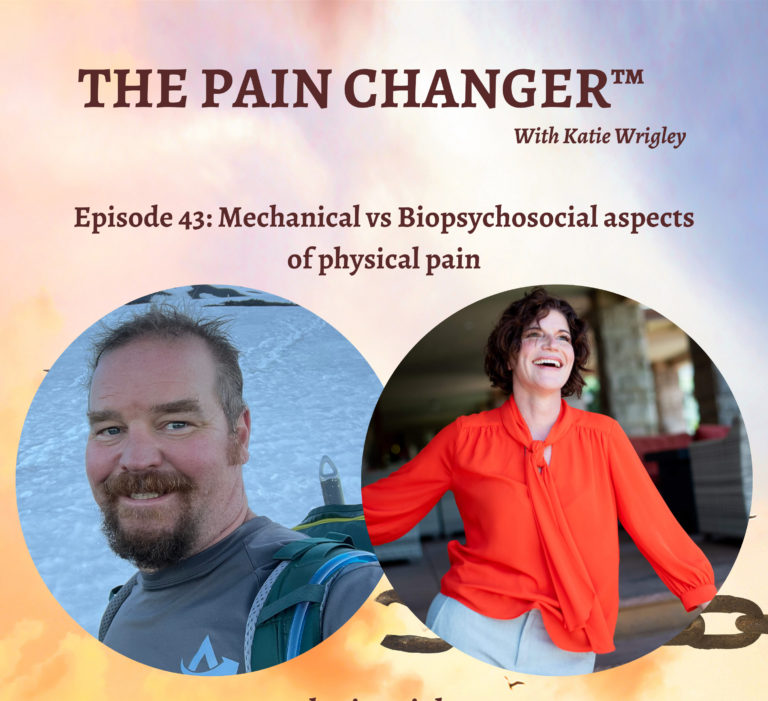Episode 11: Feel it to Heal it
Transcript…
In this episode, you will learn:
What defines trauma and how it affects the brain
The difference between emotional trauma and PTSD
Actions you can take to help heal the trauma and release it from your physical body
Before we dive into this week’s episode, I wanted to give a shout out and say thank you, to all of you for everything you’re doing to help this podcast get heard. Within the first 48 hours of launching last week, we reached 500 downloads, that just blows my mind!!!! I can’t even tell you the depths of my gratitude for each and every one of you that reached out, gave me your feedback, listened to the podcast episodes. All of it. Thank you so much. Without you guys, that wouldn’t have happened. And I just want to give you my most sincere thank you from the bottom of my heart. I can’t wait to see where we go next. I also wanted to call out the first listener of the week for the pain change your podcast. The username is a bunch of numbers. So I hope that you’re listening. What I want you to do at the end, and I’ll give you the prompt again, reach out to me on Instagram @coachktdubs. And let me know that you heard me shout give you a shout out as a listener of the week. Then I will get your information and send you a gift as my way to say thank you for helping to spread the word that we can accept the diagnosis without accepting the prognosis. This week’s Listener of the Week is 4641268291438. And they said, “Katie provides an informative explanation of an alternative path to pain. I’ve already listened to eight podcasts and look forward to hearing the rest. I’m learning a lot that I never knew before. I liked that these podcasts are offered at convenient bite sized time segments, most being about 20 minutes long. A new approach definitely worth considering by any of us who are feeling trapped in chronic pain. Can’t “hurt” to try it.” Thank you so much my Listener of the Week! I hope you reach out to me on Instagram so I can personally send you my thank you. Now for the show. I hope you guys enjoy.This is the pain changer podcast episode 11. Is PTSD a term you know? Maybe it’s new for you, or maybe you’ve been diagnosed with it. Or maybe it’s somewhere in between those two extremes for you. This week, we’re going to chat about emotional trauma and PTSD. There’s a slice of good news in here. It’s possible to avoid PTSD, even after you have experienced emotional trauma. And it’s possible to heal PTSD too. PTSD does not have to be a permanent diagnosis. Stay tuned. That’s coming up next. Before we dive in, I do want to let you know that this will be an episode with less humor than most. There really isn’t anything funny about trauma. However, I’m going to do my best to lace in some laughs and lightness where I feel I can without disrespecting anyone suffering with trauma or PTSD. The idea for this episode came to mind when recently, someone asked me for information on emotional trauma to add to a wellness program, they’re rolling out to 1000s of members of law enforcement. In addition to being honored that I was asked to contribute, it also got me really thinking, life is pretty damn traumatic. I really don’t like blanket statements like that, as they tend to lead to a twinge of depression when I think about them or say them. But in this case, I strongly feel it’s true. Depending on your age, on the event, anything from being left alone in a cold room as an infant, too small to cover yourself, to going to war, to being personally violated or abused in some way. There are so many events that can cause trauma. Unlike other species, though, as a human, you may try to talk yourself out of the fact you are traumatized, probably while also simultaneously telling your friends and family how traumatic that event was for you. As humans, we have a tendency to try to minimize it for some reason, or deny it. This can look something like you wouldn’t believe what happened to me, holy crap, it was scary. Then you tell your story. Your loved ones react and respond and then immediately, but it could have been so much worse, at least I survived. This is where the trauma can and will turn into PTSD, due to the fact that you will try to downplay your own experience, or avoid the emotions or minimize them or dismiss them or deny them which will leave the energy inside of the physical body where it can and will continue to do damage. Let me back up a moment first. As I sat down to write this episode, I thought about the myriad ways that trauma impacts your life and all the manifestations of trauma that you see out there. There are so many places I could take this episode. And I decided I wanted to talk to you. The one who feels like you aren’t seeing, I see you the one who feels like you’re not understood. I see you to the one who feels so alone. Even when standing next to someone you love. I’m with you. I’m talking to you. And I used to be you, the addict. They used to be used to the police officer, the agoraphobic the one with the anxiety disorder, the fireman, the one with bipolar disorder, the adult survivor of childhood abuse, the first responder, the one with uncontrollable rage, the one who curls into a ball and completely shuts down and talking to you. I’m so sorry that you’ve been hurt so deeply. Trauma is awful to go through. There’s no other way to describe it. Oh, actually, that’s not true. Trauma is shitty, it’s fucked up. It’s gut wrenching. It’s soul stealing. It’s scary. It’s terrifying. In a nutshell, it’s a whole new level of suckage. The one thing that each of those descriptions has in common is that you have all experienced trauma. Trauma is either prevalent in your day to day life, such as with the police officer, first responder, or the description as the outcome of the trauma, such as the case is with the addict and the one with bipolar disorder. So what exactly is trauma? And why does it affect you so deeply? Better yet…Why do you try to lessen your experience and blow it off as less than it was for you or to deny that it happened?Let’s start with defining trauma and exploring what it looks like when someone has been influenced by trauma, according to the output of googling definition of trauma, putting “definition of trauma” in quotes there, the dictionary says trauma is again “a deeply distressing or disturbing experience”, that’s a pretty vague description, but I’ll circle back to it in a moment. There are three types of trauma as well. A one time event such as an accident or witnessing a shooting, being part of a situation with an active shooter is referred to as acute trauma. An event that is repeated and prolonged such as abuse is considered chronic trauma. Exposure to various and multiple events, often including those that are highly invasive to the physical body is considered complex trauma. The only reason I am pointing those out is that the type of trauma is going to impact the complexity to resolve it. As I’ve discussed in other episodes, the longer the energy sits in your body without being discharged, the more damage it will do. A disturbing event, as I mentioned previously, can be something as small as an infant being left alone in a cold room, when you’re too little to pull cover over your body to stay warm. It can also be something much, much bigger, such as being physically or sexually assaulted. Even surgery can be considered to be traumatic, because your subconscious knows what’s going on, even if your conscious mind is down for the count. Trauma will change your brain and a few areas too. And this is where it’s really important. This is the key of why our brain starts to function differently. So bear with me. The first area it affects is the amygdala, which is responsible for fight or flight and memory. And it’s part of how you control your emotions. The hippocampus, which is part of the brain that helps with learning and memory is also affected. The last part of the brain affected by trauma is the prefrontal cortex, which is the area of your brain responsible for regulating emotions and control over the amygdala. I’m sure you notice there’s an overlap and function with these areas of your brain. Those parts of the brain as well as a few others are all part of the limbic system in which your brain regulates your emotional and behavioral systems. The prefrontal cortex is separate from that. But the amygdala and the hippocampus are part of the limbic system that is also known as your pleasure and pain center as well. So what does that mean then in plain English? It means that if you’ve experienced trauma, especially complex or chronic trauma, you’re going to have a very hard time adhering to normal behavior, and an exceptionally hard time not being ruled by your emotions. If those parts of the brain that control emotions and behavior are damaged, then guess what? Right? You won’t be capable of controlling either your emotions or behavior. Trauma itself is what changes the brain, you can experience trauma without it turning into PTSD. Alternatively, if you already have PTSD, that is not a lifelong diagnosis. PTSD can be healed very carefully, and usually slowly, but it is something you can heal. A chiropractor saw in Colorado gave me a great piece of wisdom when I was diagnosed. He actually gave me a few pearls of wisdom, and I’ll be sharing some of those with some of his other tips in later episodes. This particular Pearl he gave me that day was specific to PTSD. He looked me in the eye smiled and said, you don’t have PTSD. I smiled back, although I was immediately irritated. And I said, I do. I was just diagnosed with complex PTSD. He said, I didn’t say you weren’t traumatized. I said, you don’t have PTSD. I hate that term. You have pts. Post Traumatic Stress. Sure. But let go of the D. This disorder part implies you can’t fix it. So don’t even introduce that thought to your brain. As a side note,did you catch how much I needed to identify as someone with PTSD in that conversation? I was immediately irritated when he told me I didn’t have it. Because to me, I had just been given the piece that explained my decades of shitty decisions and behavior, my inability to control my emotions, my super fast and sharp temper, I wanted trauma to be a part of that identity too. And I needed it to be at the time. And he was also right. Even as I rejected it as denial, my brain immediately latched on to the idea that I could get rid of it. I may have needed that to be a part of me to understand myself, but I had no desire to hang on to it. But in that moment, I needed to feel like a victim. And I was, and his perspective pulled me immediately out of it, which I needed just as much. You only need to acknowledge and feel those heavy emotions, you do not want or need to stay in them very long. This brings me to what PTSD is, and what turns into what and what this brings me to what PTSD is, and what turns emotional trauma into PTSD. Then I want to explore how to potentially prevent a trauma from turning into PTSD. A traumatic event or events turn into PTSD when the impact of the event continues months and years after the incident is over. You have flashbacks to what happened, you get triggered by certain people, places or types of events, due to the similarity of to your own traumatic experience. So you start to avoid those people, places and events, your body actually starts to feel like you’re back in the trauma when you get these flashbacks. Or when you’re avoiding it, your body is feeling it still. It can create insomnia or induce nightmares or both. It can cause memory loss, especially during the time of the trauma. Even in other areas of your life. It can cause people to feel numb, or just start to seek out ways to feel numb to escape the constant visions and flashbacks. This is where addiction is really born. PTSD can also create hyper vigilance, or a state of perpetual fight or flight where you feel like you can never sit still, you always have to be doing something or you aren’t safe. And those are just a few of the symptoms of PTSD. When you’ve been traumatized, your brain is going to do some incredible things to help you survive the trauma, things like leaving your body, which is also called disassociation. Those things are resourceful at the time, and they will help you survive. Your subconscious will hold on to those things, though, and create a pattern that your conscious mind will have zero awareness of, and most of the time, that pattern is no longer resourceful. It is only resourceful during the trauma. For instance, within my own trauma as a child, the people who had abused me taught me that if I could just endure through the abuse, then the love and the snuggles would come next. So guess what I did later on in my dating life until I understood and saw that pattern? Yeah, I dated men who treated me like crap. And I would let them come back over and over again, looking for the love and snuggles that I had been taught were coming. That was rarely the case. But it didn’t stop me from playing out that pattern over and over again. Resourceful? Not even a little bit.Let me pause here for a minute. I’ve covered a lot. The ways that trauma has impacted the brain will affect memories, emotion and behavior. We can see aggression, we can see violence. There’s a lot of different impacts that come out in behavior. Emotional trauma is any deeply distressing or disturbing event where you feel emotional trauma is any deeply distressing or disturbing event where you fear for the safety of your body or your life, such as a physicalemotional trauma is any deeply distressing or disturbing event where you fear for the safety of your body and for your life, such as a physical attack, or personal violation, witnessing violence or being part of violence being abused in any way, fighting in a war and other examples that I gave earlier. Being in chronic pain is traumatic and that alone can put your brain into a state of hyper vigilance. Your nervous system is constantly cranked up when you’re in pain. And when you’re traumatized, your subconscious will do anything possible to protect you. And that usually results in creating the pattern or patterns that are not resourceful after the trauma has passed. So what can be done to avoid PTSD? The only way to avoid the horror of trauma, and only for a very few ways that you can be traumatized is to make better decisions that will avoid situations that can result in trauma. Well, I barely even got that sentence out. I only bring this up because over and over again, I hear people try to simplify and solve someone else’s life for them. “They shouldn’t have done that.” Well, no shit Sherlock, but they did. And that advice to make better decisions? It’s both minimizing and dismissive. And it’s not going to stop someone wanting to fight for their country and who winds up experiencing all the horrors and fear with war that come with that simply because they were patriotic and they wanted to be in the military. That’s not a decision-based thing that someone is going to change because you tell them to make a better decision. For the person who is still on a self destructive pattern like I was due to early childhood trauma, such as what I endured, you may not yet be capable of making better decisions less likely to result in physical harm to your body. That was certainly the case with me. I walked into situation after situation because I didn’t know how not to, I literally did not have the skill set. And if your story is similar to mine, that may be the case for you too. And that little crappy piece of advice. It’s also not going to stop the drunk driver from slamming head on into you when you are 100%, sober, obeying all the laws and making solid decisions. So that is not the bullshit advice I’m gonna give you today. If it was that easy, the no one would need help. And you wouldn’t be hearing this podcast right now. A lot of trauma is unavoidable, especially for small children. So toss that make better decisions shit out in the wind as far as it goes for trauma. So I’m gonna start with real actionable ideas to take if you have experienced trauma. First, acknowledge what happened to you to a trusted person, or to a professional, optimally to both. Let them know what happened to you. Don’t make excuses. And please do not try to avoid anything you feel. You may not be able to identify how you feel at first, and that’s okay. To say that out loud. I don’t know how I feel right now. I’m overwhelmed. Guess what? Overwhelm is a feeling. Stay in it. Often, there’s a deep level of shame attached to trauma. And that shame will try to keep you quiet. Please, please, please fight it. It may be really difficult to even say the words but please try your best to not dismiss what has happened to you. Regardless of what it is or how much at fault you think you may be. Or that you were told you were. Find a safe person. If you don’t have one, please reach out to me, please. You don’t have to try to deal with this alone. Chances are that you will feel better when you can vocalize your shame in a safe space to a trusted person. I can’t even tell you how many of my clients just tell me that talking about it to someone to finally just say it out loud and not be judged, has helped them tremendously. Acknowledge that you were the victim. Acknowledge however, and whatever you feel, with no apologies, no excuses. Make sure the people in your life and your professional is going to be staying in closer contact with you than normal until you start to heal from the event. Acknowledge every feeling, ride them out.Then start to realize you did survive. See the badassery in that. You made it. Continue to acknowledge any emotions you feel around the event or events. Allow them to be there. Allow anger, shame, frustration, grief, guilt, helplessness, anything and everything. Acknowledge them and feel them so you can release them. Next, pull in the power of positive emotions. Find something that will make you laugh. Even if you don’t feel like laughing yet. Just try. Go find things to do that. Put a smile on your face again. Even if you aren’t feeling very energetic or motivated yet, just try it. The act of doing something you enjoy even if you aren’t feeling it can help your mental status and help your brain heal and release the trauma. Continue to acknowledge any negative emotions coming up. Remind yourself that you survived without diminishing your experience by comparing it to someone who suffered a worse trauma. This next one may sound strange, but that won’t be the first time I’ve said or done something strange on this podcast or at all. But in looking at the event from a distance as time passes, can you see anything positive in it? Again, I’m not looking for something like, oh, it could have been worse. That’s minimizing, I’m shaking my head over here. I’m looking for something like, “if that hadn’t happened, then so and so wouldn’t have come into my life”, or “I wouldn’t have had the depth of understanding that I do now”. Or, “without that event, I wouldn’t have discovered some other amazing thing”. That’s what I mean about finding something positive, the silver lining in a shitstorm from hell. For me, what I’m doing with this podcast, when I’m trying to do with this career, I would have never been led here, if I hadn’t run from my own trauma for 40 years. So that is the silver lining in my own shitstorm is that it’s equipped me to be able to be here for you now, and I thank you so much for giving me the space. Cognomovement can help reduce the impact of trauma in the body and brain to it can help process out those tough emotions and help your brain return to a normal state again, it can also help release a feeling of perpetual fight or flight. Those are very short sessions, especially right after the trauma. There are techniques that myself or another Cognomovement practitioner can do to help your brain process the trauma more easily and more effectively. Another thing you can do to help yourself, is help others. Be of service, be part of a support group, or hold space for someone who has been traumatized. When we help someone else in crisis, and helps us too. And even just helping in general volunteering somewhere, it makes us feel so good and so capable. Those are some positive emotions you can tap into, to help release that trauma out of your body in your brain. You guys still with me? Awesome. Thanks for staying here. I know this was a heavier episode. And I really hope to give you some ideas of how to identify trauma and help to release it from your body, either before or after the diagnosis, PTSD, preferably before. There were so many ways that I could take this podcast and I could have gone deeper in so many areas. You know, something I really want to talk about in a future episode is what happens when you have two traumatized people face to face, such as the police officer and the addict. You now have two traumatize people squaring off. That is a different skill set we’re not going to explore in this podcast, but I hope to in a future episode. But just please, I hope you take with you today the depths and complexity of trauma and there is something you can do to start to heal. Thank you so much for joining me today. All right, guys! Next week, I have a treat for you. In an earlier episode, I mentioned that a functional medicine doctor is vastly different than a traditional medicine doctor. But I didn’t really tell you how. Next week I’m going to be talking to Dr. Sean McCloy. He took the path of being a traditional MD and he opted to go into functional medicine. Join us you can learn the difference for yourself and how a functional medicine doctor can help those with chronic conditions.


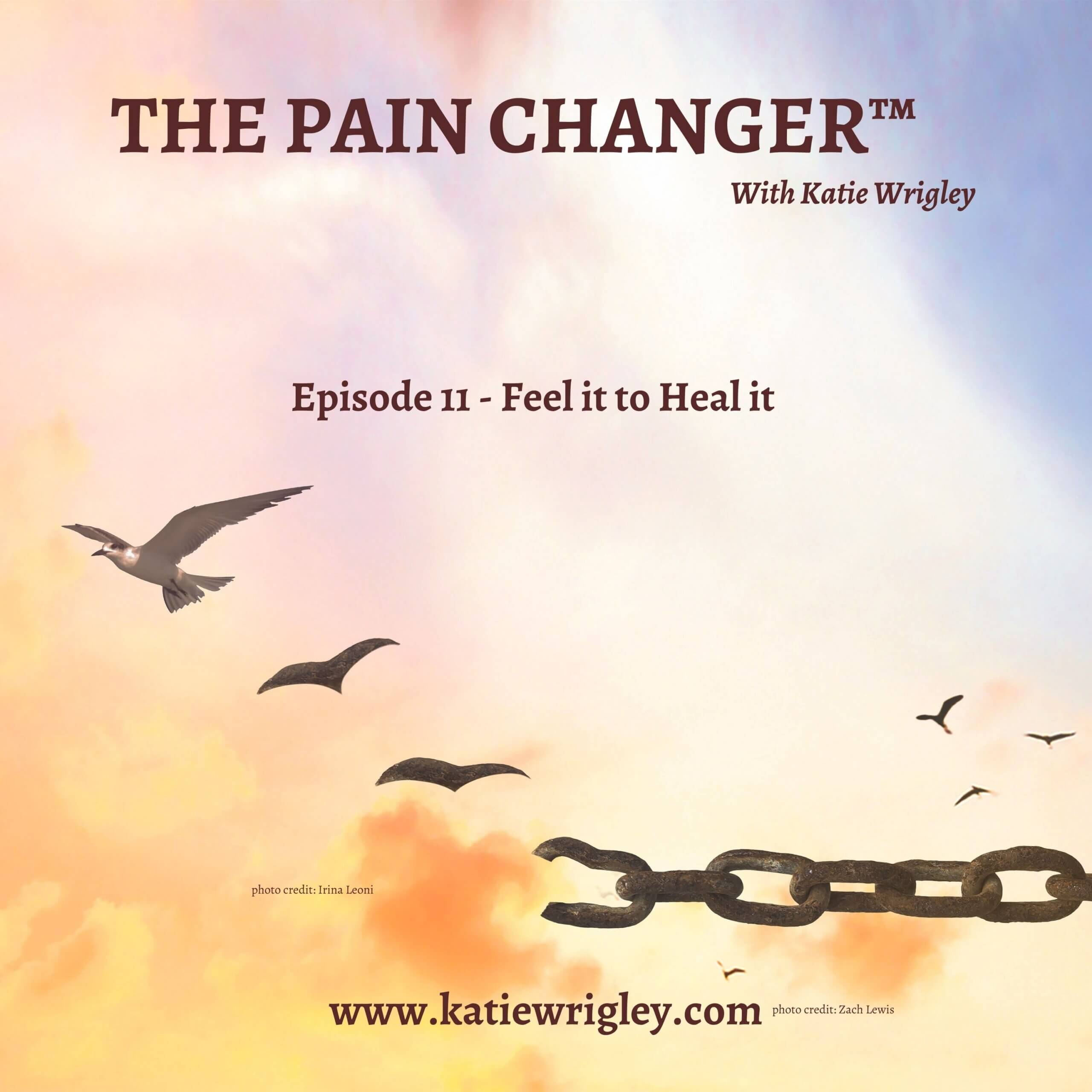
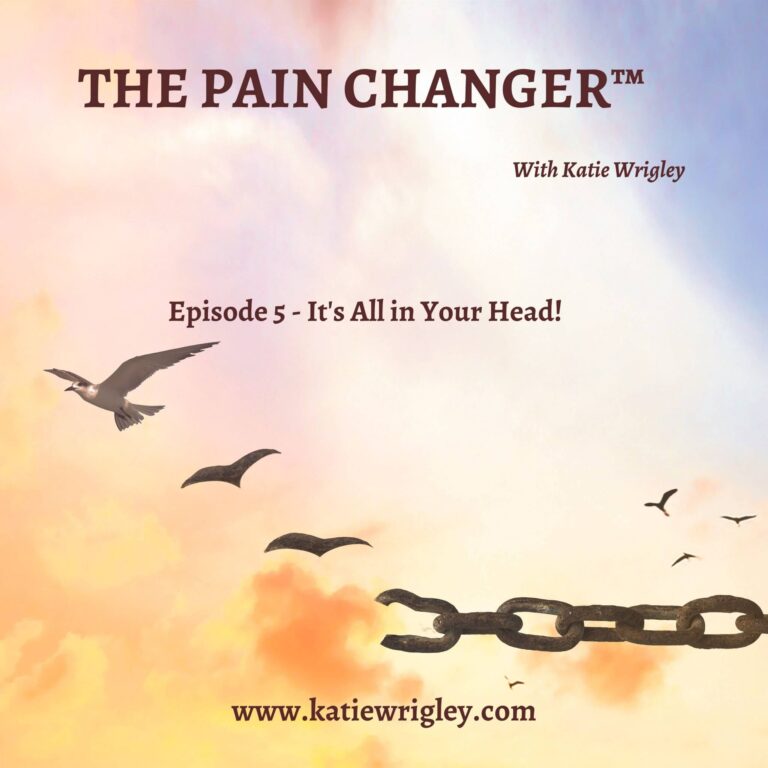
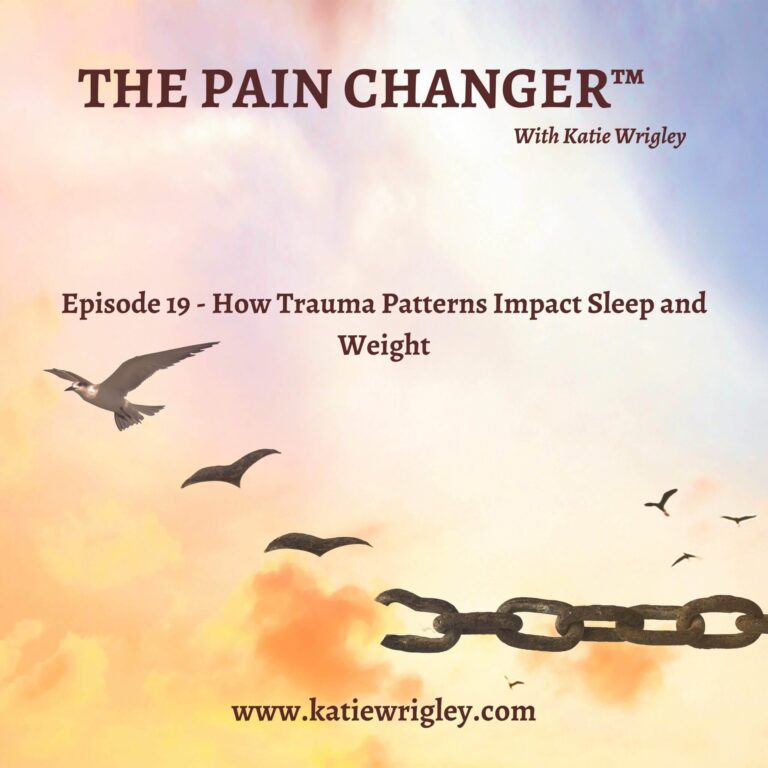
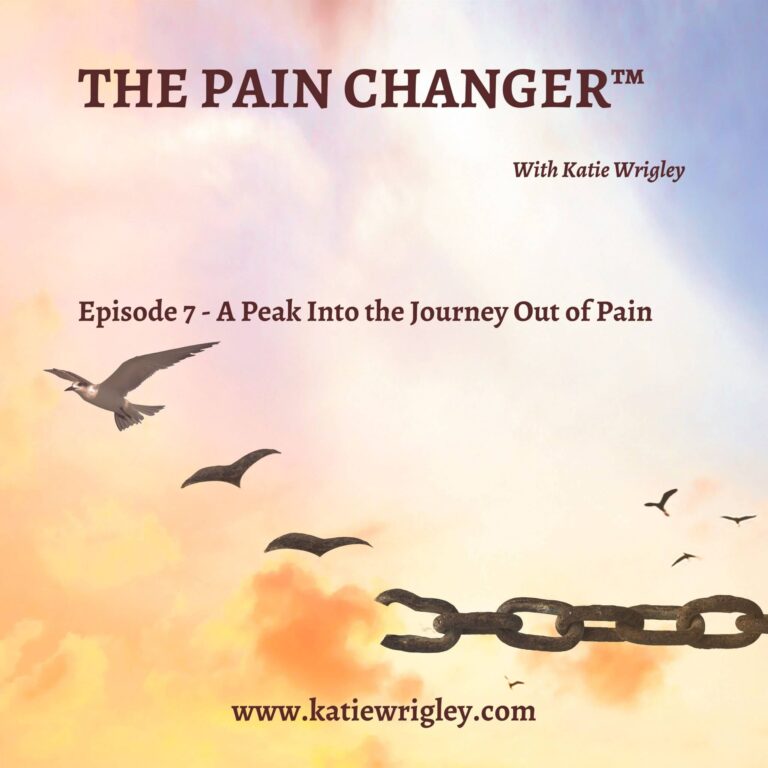
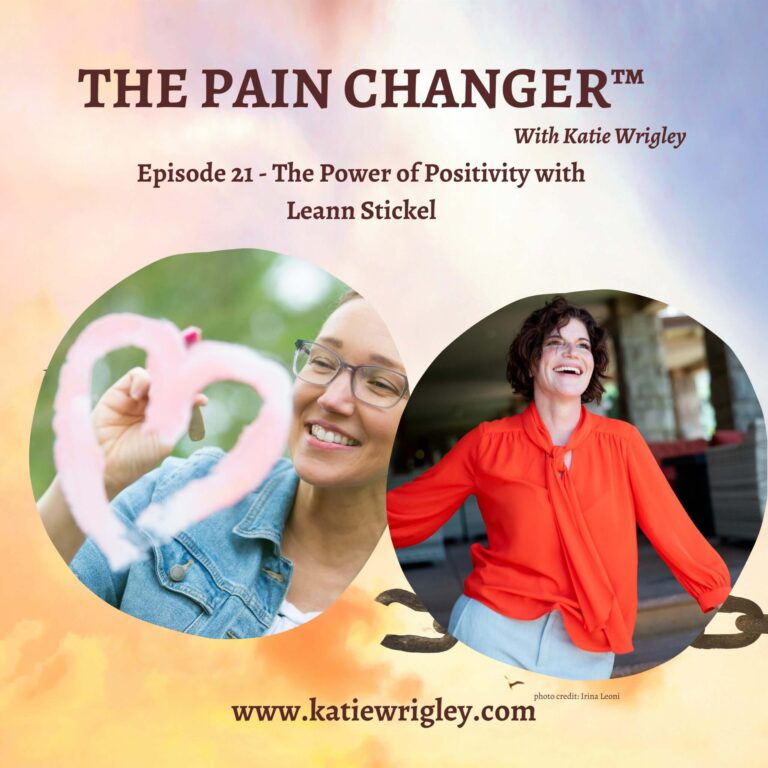
![Episode 36.5: Happiness for [the Holidays] Any Day](https://katiewrigley.com/wp-content/uploads/2022/11/THE-pain-changer-bonus-holiday-episode-scaled-1-768x768.jpg)
